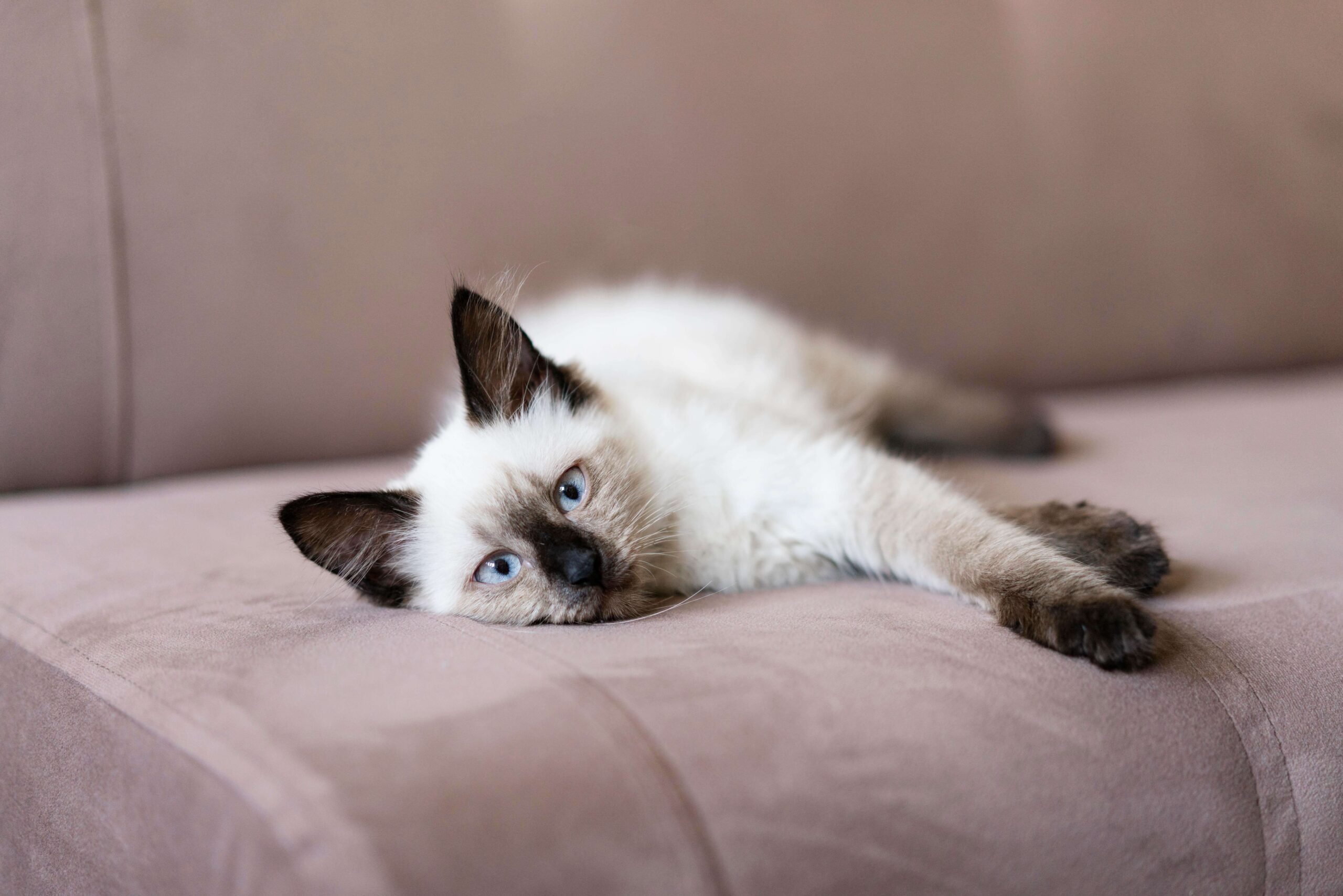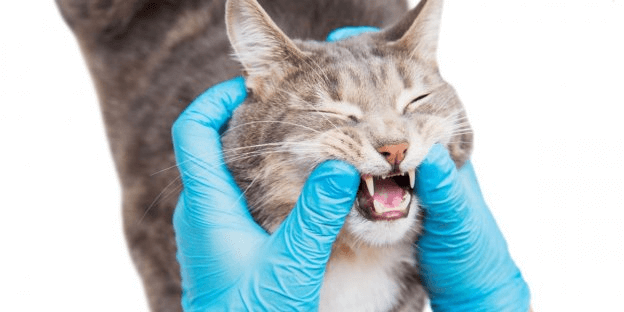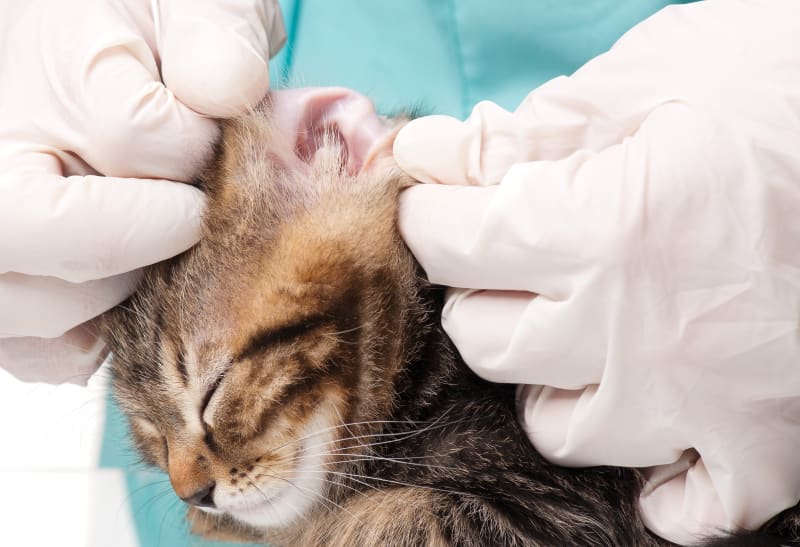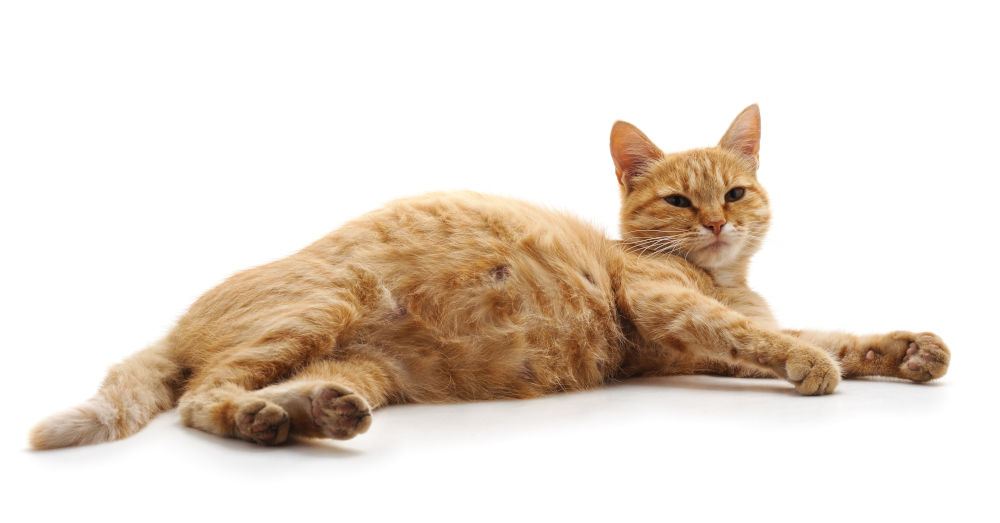Have you ever noticed blood spots on your cat’s bed or other places where they sleep or rest? If so, you may be wondering what is causing them and how to treat them. A cat leaving blood spots on bed can be a sign of various health issues, ranging from minor wounds to serious diseases.
We will explore the possible causes of blood spots in cats, their symptoms, and their treatment options. We will also provide some tips and recommendations for cat owners to prevent or reduce the occurrence of blood spots in cats.
By the end of this piece of knowledge, you will have a better understanding of why your cat may be leaving blood spots on their bed and what you can do to help them.
Different Causes of Your Cat Leaving Blood Spots On Bed
1- Minor wounds in cats
One of the possible causes of blood spots on your cat’s bed is minor wounds. Minor wounds are injuries that affect the skin or the underlying tissues, such as scratches, cuts, bites, etc. Cats can get minor wounds from various sources, such as other cats, dogs, rodents, insects, plants, or objects.
Minor wounds can result in blood spots if the wound is deep enough to cause bleeding, or if the wound is reopened by scratching or licking. Some of the symptoms of minor wounds in cats are visible blood, pain, swelling, infection, etc.
You may notice your cat licking or biting the affected area, or showing signs of discomfort or aggression. If the wound is infected, you may also notice pus, redness, heat, or odor. In some cases, minor wounds can lead to more serious complications, such as abscesses, cellulitis, or septicemia.
The treatment of minor wounds in cats depends on the severity and location of the wound. For small and superficial wounds, you can clean them with warm water and mild soap, and apply a bandage or a dressing to protect them from further damage.
You can also use an antiseptic spray or cream to prevent infection. For larger and deeper wounds, you may need to take your cat to the vet for proper cleaning, stitching, and antibiotics. You should also monitor your cat’s wound for any signs of infection or healing problems, and change the bandage or dressing regularly.
2- Urinary tract infections in cats
Another possible cause of blood spots on your cat’s bed is urinary tract infections. Urinary tract infections are infections that affect the lower urinary system, such as the bladder or the urethra. Various factors, such as bacteria, crystals, stress, etc can cause urinary tract infections.
Bacteria can enter the urinary tract through the urethra and cause inflammation and infection. Crystals are small mineral deposits that can form in the urine and irritate the bladder or the urethra. Stress can affect the cat’s immune system, making them more prone to urinary tract infections.
Some symptoms of urinary tract infections in cats are blood in urine, difficulty urinating, frequent urination, etc. You may notice your cat straining to urinate, urinating in small amounts, or urinating outside the litter box.
You may also notice blood or mucus in the urine or a foul smell. If the infection is severe, your cat may also show signs of pain, fever, lethargy, or loss of appetite. The treatment of urinary tract infections in cats depends on the cause and the severity of the infection. For mild and uncomplicated infections, you can help your cat by increasing their hydration, changing their diet, and giving them medication. Hydration can help flush out the bacteria and the crystals from the urinary tract. Diet can help prevent the formation of crystals and maintain the pH balance of the urine. Medication can help reduce the inflammation and the infection. For severe and complicated infections, you may need to take your cat to the vet for further diagnosis and treatment.
Your vet may perform tests such as urine analysis, urine culture, or ultrasound to determine the exact cause and extent of the infection. Your vet may also prescribe stronger medication, such as antibiotics or painkillers, or perform surgery, such as catheterization or cystotomy, to remove the obstruction or the infection.
3- Bleeding from the Mouth in Cats
Another possible cause of blood spots on your cat’s bed is bleeding from the mouth. Bleeding from the mouth can be caused by various factors, such as gum disease, dental problems, trauma, etc. Gum disease is a common condition that affects the gums and the bones that support the teeth.
Gum disease can cause inflammation, infection, and bleeding of the gums. Dental problems are issues that affect the teeth, such as cavities, fractures, or abscesses. Dental problems can cause pain, infection, and bleeding of the teeth or the surrounding tissues.
Trauma is any injury that affects the mouth, such as bites, burns, or foreign objects. Trauma can cause cuts, bruises, or bleeding of the mouth. Some of the symptoms of bleeding from the mouth in cats are blood in saliva, drooling, bad breath, difficulty eating, etc. You may notice your cat spitting or swallowing blood, or leaving blood spots on their bed or other surfaces.
You may also notice your cat drooling excessively, having a foul smell from their mouth, or showing signs of discomfort or reluctance to eat or drink. If the bleeding is severe, your cat may also show signs of anemia, such as pale gums, weakness, or lethargy. The treatment of bleeding from the mouth in cats depends on the cause and amount of the bleeding.
For mild and occasional bleeding, you can help your cat by providing them with dental care, such as brushing their teeth, giving them dental treats, or taking them to the vet for regular check-ups and cleaning. Dental care can help prevent or reduce the occurrence of gum disease and dental problems.
For moderate and persistent bleeding, you may need to take your cat to the vet for further diagnosis and treatment. Your vet may perform tests such as blood work, x-rays, or biopsy to determine the exact cause and extent of the bleeding. Your vet may also prescribe medication, such as antibiotics or painkillers, or perform surgery, such as tooth extraction or tumor removal, to stop the bleeding and treat the underlying condition.
4- Bleeding from the Anus in Cats
Another possible cause of blood spots on your cat’s bed is bleeding from the anus. Bleeding from the anus can be caused by various factors, such as tumors, polyps, cancer, constipation, etc. Tumors are abnormal growths that can develop in the rectum or the colon.
Tumors can cause bleeding, obstruction, or perforation of the bowel. Polyps are benign growths that can protrude from the lining of the rectum or the colon. Polyps can cause bleeding, inflammation, or infection of the bowel. Cancer is a malignant condition that can affect the rectum or the colon.
Cancer can cause bleeding, ulceration, or metastasis of the bowel. Constipation is a condition that occurs when the stool is hard and dry and difficult to pass. Constipation can cause bleeding, straining, or impaction of the bowel.
Some of the symptoms of bleeding from the anus in cats are blood in stool, diarrhea, weight loss, etc. You may notice your cat passing blood or mucus with their stool, or having loose or watery stool. You may also notice your cat losing weight, having a reduced appetite, or showing signs of pain or discomfort.
If the bleeding is severe, your cat may also show signs of shock, such as pale gums, rapid breathing, or collapse. The treatment of bleeding from the anus in cats depends on the cause and the severity of the bleeding. For mild and occasional bleeding, you can help your cat by changing their diet, giving them medication, or providing them with fluids.
Diet can help soften the stool and prevent constipation or irritation of the bowel. Medication can help reduce the inflammation and the infection of the bowel. Fluids can help prevent dehydration and electrolyte imbalance. For moderate and persistent bleeding, you may need to take your cat to the vet for further diagnosis and treatment.
Your vet may perform tests such as blood work, fecal analysis, or endoscopy to determine the exact cause and extent of the bleeding. Your vet may also prescribe medication, such as antibiotics or steroids, or perform surgery, such as tumor removal or colostomy, to stop the bleeding and treat the underlying condition.
5- Hematoma of the Ear in Cats
Another possible cause of blood spots on your cat’s bed is a hematoma of the ear. Hematoma of the ear is a condition that occurs when blood accumulates under the skin of the ear flap, causing it to swell and bulge. Hematoma of the ear can be caused by various factors, such as ear mites, fleas, allergies, etc.
Ear mites are tiny parasites that can infest the ear canal and cause itching and irritation. Fleas are small insects that can bite the ear and cause inflammation and infection. Allergies are hypersensitive reactions that can affect the ear and cause itching and inflammation.
Some of the symptoms of hematoma of the ear in cats are blood in the ear, swelling, head shaking, etc. You may notice your cat having a swollen or lumpy ear, or leaving blood spots on their bed or other surfaces. You may also notice your cat shaking their head excessively, scratching their ear, or showing signs of pain or discomfort. If the hematoma is severe, your cat may also show signs of hearing loss, ear infection, or deformity.
The treatment of hematoma of the ear in cats depends on the cause and the severity of the hematoma. For mild and small hematomas, you can help your cat by giving them medication, such as anti-inflammatory or anti-histamine, to reduce the swelling and the itching.
You can also apply a cold compress to the ear to relieve the pain and the inflammation. For moderate and large hematomas, you may need to take your cat to the vet for further diagnosis and treatment. Your vet may perform tests such as ear swabs, skin scrapes, or blood work to determine the exact cause and extent of the hematoma.
Your vet may also perform a procedure, such as drainage, surgery, or laser, to remove the blood and repair the ear. You should also prevent your cat from scratching or shaking their ear, and treat the underlying condition that caused the hematoma.
6-Cat Leaving Blood Spots Will Be Pregnancy Complications
pregnancy complications may be possible reasons if your cat leaves blood spots on bed. Pregnancy complications are problems that occur during or after pregnancy, and they can affect the health of the mother or the kittens. Some of the pregnancy complications that can cause bleeding spots in cats are:
- Miscarriage: This is when the pregnancy ends before the kittens are fully developed. Miscarriage can be caused by trauma, infection, genetic defects, or hormonal imbalance. Miscarriage can result in bleeding from the vagina, along with other signs such as abdominal pain, fever, or discharge.
- Ectopic pregnancy: This is when the fertilized egg implants outside the uterus, usually in the fallopian tube. Ectopic pregnancy can be caused by inflammation, scarring, or abnormality of the reproductive tract. Ectopic pregnancy can result in bleeding from the vagina, along with other signs such as severe pain, shock, or collapse.
- Placental detachment: This is when the placenta separates from the uterine wall before or during delivery. Placental detachment can be caused by trauma, infection, or abnormality of the placenta or the uterus. Placental detachment can result in bleeding from the vagina, along with other signs such as weak or absent contractions, pale gums, or distress.
- Uterine rupture: This is when the uterus tears or bursts during delivery. Uterine rupture can be caused by excessive force, obstruction, or previous injury or surgery. Uterine rupture can result in bleeding from the vagina, along with other signs such as shock, hemorrhage, or death.
If you suspect that your cat has a pregnancy complication, you should take them to the vet immediately, as they may need emergency treatment or surgery. You should also monitor your cat’s pregnancy closely and provide them with proper care and nutrition.
7- ANAL GLAND PROBLEM
One of the possible reasons for your cat leaving blood spots on bed is anal gland problems. Anal glands are small sacs that produce a strong-smelling secretion that cats use for communication and marking.
However, sometimes the anal glands can become over-full, impacted, infected, or cancerous, causing pain, inflammation, and bleeding. floor, or having a foul odor from their rear end. You may also see blood or pus on their bed, their stool, or their anus. If your cat has any of these signs, you should take them to the vet for diagnosis and treatment.
Your vet may need to manually empty the anal glands, prescribe antibiotics or painkillers, or perform surgery to remove the glands. You can also help your cat by feeding them a high-fibre diet, keeping them flea-free, and checking their anal glands regularly.
8- FLEA INFESTATION
One of the possible reasons why your cat may be leaving blood spots on their bed is flea infestation. Fleas are small insects that feed on the blood of cats and other animals. Fleas can cause itching, irritation, and inflammation of the skin, as well as allergic reactions, anemia, or infections.
Fleas can also transmit diseases, such as tapeworms, cat scratch fever, or plague. You may notice your cat scratching or biting their fur, having red or scaly patches on their skin, or losing hair. You may also see fleas or flea dirt (flea faeces) on their coat, their bed, or their environment.
If your cat has a flea allergy, you may see blood spots on their bed, as they may scratch or bite their skin until it bleeds. If your cat has a flea infestation, you should take them to the vet for diagnosis and treatment. Your vet may prescribe medication, such as topical or oral flea control, or injections, to kill the fleas and relieve the symptoms.
You should also treat your cat’s environment, such as bedding, furniture, or carpets, with flea spray or powder, and wash them regularly. You can also prevent flea infestation by keeping your cat indoors, grooming them frequently, and using flea prevention products.
What are some natural remedies for minor wounds in cats leave tiny blood spots?
Cats are curious and adventurous creatures, but sometimes their curiosity can get them into trouble. Whether they get into a fight with another cat, scratch themselves on a sharp object, or bite their tongue, cats can easily get minor wounds that need attention.
Minor wounds are injuries that affect the skin or the underlying tissues, such as scratches, cuts, bites, etc. They can cause bleeding, pain, swelling, or infection if not treated properly.
While some wounds may require veterinary care, especially if they are deep, large, or infected, others can be treated at home with some natural remedies. Natural remedies are substances or methods that use natural ingredients or processes to heal or prevent diseases.
They can be cheaper, safer, and more accessible than conventional treatments, but they should not replace professional medical advice. Always consult with your veterinarian before using any natural remedy on your cat, and monitor your cat’s wound for any signs of worsening or complications.
In this blog post, we will explore some of the natural remedies that you can use to treat minor wounds in cats, such as:
- Water and soap
- Raw Manuka honey
- Aloe vera gel
- Turmeric paste
- Coconut oil
- Chamomile tea
We will also explain how to use them, what are their benefits and drawbacks, and what are precautions to take when using them.
Water and soap
The first and simplest natural remedy for minor wounds in cats is water and soap. Water and soap can help clean the wound and remove any dirt, debris, or bacteria that could cause infection. Cleaning the wound is the first step to prevent infection and promote healing.
To use water and soap to treat minor wounds in cats, you will need:
- Warm water
- Mild soap
- Clean cloth or cotton ball
- Tweezers (optional)
Follow these steps to clean your cat’s wound with water and soap:
- Gently restrain your cat or ask someone to help you hold them. If your cat is aggressive or uncooperative, you may need to wrap them in a towel or use a muzzle.
- Examine the wound and look for any foreign objects, such as glass, splinters, or thorns. If you see any, use tweezers to carefully remove them. Do not use your fingers, as you may push them deeper into the wound or injure yourself.
- Wet a clean cloth or cotton ball with warm water and gently wipe the wound. Do not rub or scrub the wound, as this may cause more damage or bleeding.
- Apply a small amount of mild soap to the cloth or cotton ball and gently lather the wound. Avoid using harsh or perfumed soap, as this may irritate the wound or cause allergic reactions. Rinse the soap off with warm water.
- Repeat steps 3 and 4 until the wound is clean and free of dirt and soap. Pat the wound dry with a clean cloth or cotton ball.
- Apply a natural antiseptic or healing agent, such as raw Manuka honey, aloe vera gel, or turmeric paste, to the wound. Cover the wound with a bandage or a dressing if needed.
Some of the benefits of using water and soap to treat minor wounds in cats are:
- It is easy to use and readily available
- It is inexpensive and cost-effective
- It is gentle and non-toxic
- It can reduce the risk of infection and inflammation
Some of the drawbacks of using water and soap to treat minor wounds in cats are:
- It may not be enough to treat deep, large, or infected wounds
- It may be difficult to hold your cat still while cleaning the wound
- It may cause pain or discomfort to your cat
Some of the precautions to take when using water and soap to treat minor wounds in cats are:
- Always use warm water, not hot or cold, as this may burn or shock your cat
- Always use mild soap, not detergent, bleach, or alcohol, as this may harm your cat’s skin or cause poisoning
- Always rinse the soap off thoroughly, as this may cause irritation or dryness
- Always dry the wound well, as this may prevent moisture buildup and infection
- Always check the wound for signs of infection, such as pus, redness, heat, or odor, and contact your vet if you notice any
Raw Manuka honey
The second natural remedy for minor wounds in cats is raw Manuka honey. Raw Manuka honey is a type of honey that is produced by bees that feed on the Manuka flower, which grows in New Zealand and Australia.
Raw Manuka honey has antibacterial, anti-inflammatory, and antioxidant properties that can help heal minor wounds in cats. It can kill harmful bacteria, reduce swelling and pain, and stimulate tissue regeneration.
To use raw Manuka honey to treat minor wounds in cats, you will need:
- Raw Manuka honey
- Clean cloth or cotton ball
- Bandage or dressing (optional)
Follow these steps to apply raw Manuka honey to your cat’s wound:
- Gently restrain your cat or ask someone to help you hold them. If your cat is aggressive or uncooperative, you may need to wrap them in a towel or use a muzzle.
- Clean the wound with water and soap, as described above.
- Apply a thin layer of raw Manuka honey to the wound using a clean cloth or cotton ball. Do not use regular honey, as this may contain impurities or additives that could harm your cat. Do not use too much honey, as this may attract insects or cause a sticky mess.
- Cover the wound with a bandage or a dressing if needed. Change the bandage or dressing daily and reapply the honey as needed.
Some of the benefits of using raw Manuka honey to treat minor wounds in cats are:
- It is natural and organic
- It is effective and potent
- It is soothing and moisturizing
- It can speed up the healing process and prevent scarring
Some of the drawbacks of using raw Manuka honey to treat minor wounds in cats are:
- It is expensive and hard to find
- It is sticky and messy
- It may cause allergic reactions or digestive problems in some cats
- It may not be suitable for some wounds, such as bleeding or post-surgery wounds
Some of the precautions to take when using raw Manuka honey to treat minor wounds in cats are:
- Always use raw Manuka honey, not processed or pasteurized honey, as this may lose its medicinal properties or contain harmful substances
- Always buy raw Manuka honey from a reputable source, such as a health food store or an online vendor, and check the label for the UMF (Unique Manuka Factor) rating, which indicates the potency and quality of the honey
- Always store raw Manuka, honey, in a cool and dark place, and do not refrigerate or heat it, as this may affect its consistency and effectiveness
- Always consult your vet before using raw Manuka honey on your cat, and monitor your cat for any signs of adverse reactions, such as itching, swelling, or vomiting, and stop using it if you notice any
Aloe vera gel
The third natural remedy for minor wounds in cats is aloe vera gel. Aloe vera gel is a clear and gel-like substance that is extracted from the leaves of the aloe vera plant, which grows in tropical and subtropical regions.
Aloe vera gel has anti-inflammatory, antiseptic, and moisturizing properties that can help heal minor wounds in cats. It can reduce swelling and pain, prevent infection and inflammation, and hydrate and nourish the skin.
To use aloe vera gel to treat minor wounds in cats, you will need:
- Aloe vera gel
- Clean cloth or cotton ball
- Bandage or dressing (optional)
Follow these steps to apply aloe vera gel to your cat’s wound:
- Gently restrain your cat or ask someone to help you hold them. If your cat is aggressive or uncooperative, you may need to wrap them in a towel or use a muzzle.
- Clean the wound with water and soap, as described above.
- Apply a thin layer of aloe vera gel to the wound using a clean cloth or cotton ball. Do not use aloe vera juice, as this may contain aloin, a yellow substance that can irritate the wound or cause diarrhea in cats. Do not use too much gel, as this may cause a sticky mess or prevent the wound from breathing.
- Cover the wound with a bandage or a dressing if needed. Change the bandage or dressing daily and reapply the gel as needed.
Some of the benefits of using aloe vera gel to treat minor wounds in cats are:
- It is natural and safe
- It is easy to use and readily available
- It is gentle and soothing
- It can promote the healing process and prevent scarring
Some of the drawbacks of using aloe vera gel to treat minor wounds in cats are:
- It is not very effective against bacteria or fungi
- It may cause allergic reactions or skin irritation in some cats
- It may not be suitable for some wounds, such as deep, large, or infected wounds
Some of the precautions to take when using aloe vera gel to treat minor wounds in cats are:
- Always use pure aloe vera gel, not products that contain aloe vera as an ingredient, as they may have other substances that could harm your cat
- Always buy aloe vera gel from a reputable source, such as a health food store or an online vendor, and check the label for the ingredients and expiration date
- Always store aloe vera gel in a cool and dark place, and do
Conclusion
Blood spots on your cat’s bed can be a sign of various health issues, such as minor wounds, urinary tract infections, bleeding from the mouth, bleeding from the anus, or hematoma of the ear. These issues can have different causes, symptoms, and treatment options, depending on the severity and location of the bleeding.
It is important to identify and treat the causes of your cat leaving blood spots on bed as they can affect your cat’s well-being and quality of life. To prevent or reduce the occurrence of blood spots in cats, you can follow some tips and recommendations, such as providing your cat with dental care, changing their diet, increasing their hydration, preventing them from scratching or shaking their ears, and taking them to the vet for regular check-ups and cleaning.
By doing so, you can help your cat stay healthy and happy. If you notice any signs of bleeding or infection in your cat, do not hesitate to contact your vet for professional advice and assistance. Thank you for reading this article, and we hope you found it helpful and informative.
FAQs About Cat Leaving Blood Spots on Bed
Q: What should I do if my cat leaves Tiny blood spots on bed?
A: If you see blood spots on your cat’s bed, you should first check your cat for any signs of injury, infection, or illness. You should also examine the blood spots to see if they are fresh or dried, and what color and consistency they are. Depending on the cause and severity of the bleeding, you may need to take your cat to the vet for diagnosis and treatment, or you may be able to treat them at home with some natural remedies
Q: What are some of the common causes of cats leaving blood spots on bed?
A: Some of the common causes if cat leaving blood spots on bed are minor wounds, urinary tract infections, bleeding from the mouth, bleeding from the anus, or hematoma of the ear. These issues can have different symptoms and treatment options, depending on the location and extent of the bleeding. You can learn more about each of these causes in the article.
Q: How can I prevent or reduce the occurrence of cat blood spots on a cat’s bed?
A: You can prevent or reduce the occurrence of blood spots on a cat’s bed by providing your cat with proper care and nutrition, such as feeding them a healthy diet, keeping them hydrated, grooming them regularly, and brushing their teeth. You can also protect your cat from potential sources of injury or infection, such as other cats, dogs, rodents, insects, plants, or objects. You can also monitor your cat’s health and behavior, and take them to the vet for regular check-ups and vaccinations.
Q: How can I use natural remedies to treat minor wounds in cats?
A: You can use natural remedies to treat minor wounds in cats, such as water and soap, raw Manuka honey, aloe vera gel, turmeric paste, coconut oil, or chamomile tea. These remedies have antibacterial, anti-inflammatory, or antioxidant properties that can help heal minor wounds in cats. However, you should always consult your vet before using any natural remedy on your cat, and monitor your cat’s wound for any signs of worsening or complications.
Q: How can I tell if my cat has a serious or life-threatening bleeding problem?
A: If your cat has a serious or life-threatening bleeding problem, you may notice some of the following signs: excessive or persistent bleeding, blood in urine, blood in vomit, blood in stool, pale gums, rapid breathing, weak pulse, shock, or collapse. If you notice any of these signs, you should take your cat to the vet immediately, as they may need emergency treatment or surgery.








